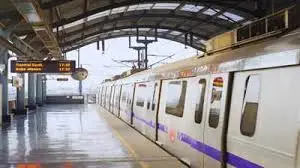Metro Railways Act amendment, parking and non-fare revenue: top officials recommend changes

In a significant move aimed at enhancing the efficiency and financial sustainability of urban metro rail systems, senior government officials and urban transport experts have recommended a series of amendments to the Metro Railways Act. These recommendations focus primarily on revising parking policies and optimizing non-fare revenue streams for metro rail operators across India.
Background: Challenges in Metro Rail Financing
Metro rail systems have become vital for the mobility of millions of urban commuters. However, despite increasing ridership, many metro projects face financial challenges due to their heavy reliance on farebox revenue alone. Operating costs, infrastructure maintenance, and expansion expenses continue to grow, often outpacing fare collections.
To address this, experts have stressed the importance of tapping into non-fare revenue sources—such as advertising, commercial leasing, and parking fees—which remain largely underutilized in current regulations.
Proposed Amendments to the Metro Railways Act
Top officials from the Ministry of Housing and Urban Affairs, in consultation with transport authorities and metro operators, have proposed amendments to the existing Metro Railways Act with the following key changes:
- Flexible Parking Policies
The amendments suggest empowering metro corporations to revise parking fees dynamically, based on demand and location. This flexibility is expected to discourage long-term parking at metro stations and promote turnover, thereby increasing revenue. - Enhanced Non-Fare Revenue Framework
The new framework encourages metro authorities to expand their non-fare revenue portfolio. It includes provisions to facilitate public-private partnerships (PPP) for commercial development within metro premises, such as retail spaces, food courts, and office leasing. - Advertising and Branding Opportunities
To maximize revenue from advertising, the amendments propose streamlined clearance processes for advertising rights within metro premises and trains. Enhanced branding opportunities aim to attract more private sector participation. - Integration with Urban Planning
The recommendations emphasize integrating metro infrastructure development with urban land-use planning. This approach would allow metro corporations to leverage their real estate assets strategically, increasing long-term non-fare income.
Impact on Commuters and Metro Operators
While these amendments aim to strengthen metro finances, officials have assured that fare structures will remain regulated to protect commuter interests. The focus on non-fare revenue will help reduce dependency on fare hikes, making metro travel more affordable.
Moreover, improved parking policies will help manage congestion around stations, improving the overall commuter experience. By generating additional revenue, metros can also invest more in service quality, safety, and network expansion.
Expert Opinions
Dr. Anil Kumar, an urban transport expert, said, “The current Metro Railways Act does not fully address the evolving financial needs of metro systems. These amendments are crucial to make metro services sustainable and commuter-friendly.”
Similarly, Ms. Priya Sharma, a senior official at a leading metro corporation, stated, “Non-fare revenue can significantly boost metro finances if properly managed. Flexible parking and commercial leasing are welcome moves that align with global best practices.”
Way Forward
The government is expected to initiate formal consultations with state governments, metro corporations, and stakeholder groups before finalizing the amendments. Public feedback will also be sought to ensure that changes benefit commuters without undue cost burdens.
In the long term, these reforms could set a benchmark for metro systems nationwide, enabling efficient urban transport that is both financially viable and commuter-centric.






